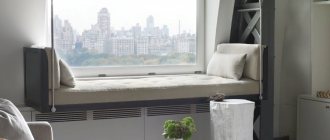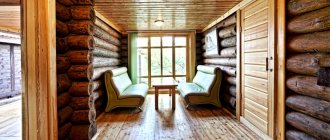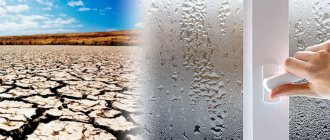Turn on the air conditioner more often
WHO experts recommend maintaining constant temperature levels in the house, no matter what time of year it is outside the window. The healthiest indicator is from +17 to +20 °C. Warm air is harmful to the respiratory organs and mucous membranes, which dry out and cease to perform their protective function. This causes constant colds. Therefore, do not forget to turn on the air conditioner and periodically clean it thoroughly. Filters need to be washed once every two weeks.
What should be the temperature in the room for comfortable sleep?
Temperatures that are too hot or too cold are not particularly good for restful sleep, so understanding the temperature fluctuations in our bodies and determining what a comfortable temperature for sleep is is a good step.
You probably know the feeling when you wake up in the middle of the night, your feet tangled in sweaty sheets, as if you were sleeping in a sauna? Trying to sleep on a hot night feels like torture. However, trembling all over your body from the cold and icy toes also do not make your sleep pleasant. Is there an ideal temperature that promotes better sleep quality? The answer will please you: a comfortable temperature for sleeping exists.
When it comes to the "ideal" temperature for sleeping, experts lean toward a cool environment rather than a hot room. It's so nice to hide under a warm blanket on a cold evening.
Required humidity level
Humidity is an important indicator of a healthy microclimate. It should not be allowed to fall below 40% indoors, but it is better to maintain it at 60%. There are various humidifiers available on the market for this purpose. When purchasing, pay attention to what type of evaporation the device has - ultrasonic or natural. The second one is more preferable; it is also good if it has water filters. They work quietly, are reliable, and do not form limescale on the furniture over time.
Tall fur guards hats are a reflection of pedantry and loyalty to customs
“If you don’t eat, you won’t grow” and other dangerous phrases that should not be said to children
Novosibirsk "Vector" supplied over 40,000 doses of the EpiVacCorona vaccine to the market
When the optimal temperature in the bedroom does not help
Our sleep and wake periods are actually regulated by light, and any light source—even something as tiny as the green light from your digital watch—can interfere with your sleep and, more importantly, your long-term health. Although it is commonly believed that our biological clock is what tells us when it's time to wake up or go to sleep, light and dark signals actually control your biological clock
More specifically, a part of the brain called the suprachiasmatic nucleus—a group of cells in your hypothalamus—controls our biological clock. And the cells that make up the suprachiasmatic nucleus respond to light and dark signals
Although it is commonly believed that our biological clock is what tells us when it's time to wake up or go to sleep, light and dark signals actually control your biological clock. More specifically, a part of the brain called the suprachiasmatic nucleus—a group of cells in your hypothalamus—controls our biological clock. And the cells that make up the suprachiasmatic nucleus respond to light and dark signals.
The light actually travels through the optic nerve of the eye to the suprachiasmatic nucleus, where it tells the body that it is time to wake up. Light also signals the suprachiasmatic nucleus to initiate other processes associated with wakefulness, such as increasing body temperature and producing hormones like cortisol.
Meanwhile, when your eyes signal to the suprachiasmatic nucleus that it is dark, your body will begin producing melatonin, a hormone that helps you sleep and radically reduces your risk of cancer. There is a lot of research on this powerful association. The more your sleep is disrupted by light pollution, the lower your melatonin levels and the greater your risk of developing cancer.
Melatonin is produced primarily in the brain, and at night it causes a variety of biochemical activities, including a nocturnal decrease in estrogen levels. Chronically decreased melatonin production at night is thought to increase the risk of cancer.
So please make sure that not only is your bedroom at the ideal temperature, but that your surroundings are also pitch black. If you need light to go to the bathroom at night, use a flashlight with a red light, as this is the wavelength that will allow you to see but not interfere with melatonin production.
How to achieve complete darkness in the bedroom:
- Curtain the windows with blackout curtains
- Get rid of the gap between the door and the bedroom floor
- Cover the electric clock radio
- How to Avoid Night Lights of Any Kind
- Turn off the TV and all display devices at night
What else can you do to improve your sleep?
Today, people get about 25 percent less sleep than they did a century ago—and it's not just a matter of lack of energy. Too little sleep affects your thyroid levels and stress hormones, which in turn can affect your memory and immune system, heart and metabolism, and more. Over time, lack of sleep can lead to the following problems:
- Weight gain
- Depression
- High blood pressure
- Elevated sugar levels and risk of diabetes
- Brain damage
Air filters
There are special “mousetraps” for dangerous microorganisms that are in the indoor air. These are devices called “air washers”. There are three stages of purification in them. First, the air is passed through a carbon filter, which removes odors and smoke, then comes a filter for more thorough cleaning. It can even hold back pathogenic bacteria. At the final stage, the water filter “washes” the air, at the same time making it more humid. With such devices you can easily maintain the humidity in the house at 50-60%.
Magic valve on pipes
During the heating season, it is very difficult to regulate the temperature and humidity in the apartment. When it's below zero, the air conditioner doesn't work. Opening the window gives a temporary result and dries out the air. The best solution in this case is radiator valves. With their help, you can shut off the supply of hot water partially or completely and lower the temperature in the apartment to the desired value of +17–22 degrees.
What temperature is suitable for children under two years of age?
The thermoregulation system in children at this age does not work as well as in adults. In addition, babies should not be covered with blankets that are too heavy and warm: they can close the child’s airways and the child will suffocate. Therefore, the temperature in the room can The safest room temperature for babies be 1–2 °C higher than that of adults. But ideally it should still not exceed 20 °C.
For young children, not only air temperature is important, but also clothing. It should not be too warm: overheating increases the risk of sudden infant death. Cotton pajamas and a sleeveless sleeping bag made of natural breathable fabric are enough.
To make sure your baby is not hot, touch his neck and abdomen. If the skin is hot and damp, remove one layer of clothing from the child.
Steam cleaning - fast and healthy
If we talk about cleaning, it is important to save energy and time and maintain a healthy microclimate in the house. This can be easily achieved using a steam cleaner. Hot steam supplied under pressure cleans any hard surface without damaging it. This way you can maintain perfect cleanliness without chemicals and wasted effort. And the air will remain fresh.
In an Irish village, sea foam reached buildings and covered houses
The smile never leaves her face: Liza Arzamasova, having become Averbukh’s wife, glows with beauty
5 “serious” myths about single women that have long sounded funny
Dangerous overheating
Heated floors are a fashionable trend that sometimes does more harm than good. Excessive enthusiasm for them is destructive; doctors call this innovation a “time bomb.” Warm floors overheat and dry out the air, which gradually affects the health of all family members. It is difficult to breathe in such a house; thermoregulation is disrupted. There is only one place where these floors are useful, and that is the bathroom.
Healthy sleep: why the air temperature in the bedroom should be cool
Healthy sleep is a very important component of human life. For this part of life, each person has his own rituals that he performs. Some people like to sleep with the windows open, regardless of the time of year, while others take a relaxing bath with foam and salt before bed. But as scientists have found out, among other things, the temperature in the room where the night's rest will take place plays a very important role. According to their observations, a person should sleep in a cool room - this way the body will be healthy and strong, says Medoboz.
Scientists explain the importance of sleeping in a cool room by the fact that in the body of every person there are two types of fats - white and brown. White fat is a reserve of calories in the body, and brown fat is the generation of heat. There is more brown fat in newborns. It allows the baby to retain the heat it receives so as not to freeze. But unfortunately, the older a person gets, the less brown fat there is in the body.
Scientists have also found that brown fat burns white fat. In other words, it burns calories from food. In America, they approached this issue with enthusiasm and scientists from the National Institutes of Health found that you can increase the level of brown fat yourself if you prefer to sleep in a cool room.
The benefits of salt lamps
Air ionization is also a very useful procedure. Salt lamps do an excellent job of this. They saturate the air in the room with negative ions, simultaneously killing dangerous microorganisms, even viruses. The atmosphere clears, becoming more favorable. The therapeutic effects of such natural ionizers have been confirmed by scientists: they increase body tone, improve sleep and overall emotional state.
We remember the history of the movement of student construction brigades: photo gallery
On Yuri Yakovlev’s 70th birthday, Myagkov originally apologized to him right on stage
The only daughter of John Travolta and Kelly Preston is already 20 years old: what she looks like
What is the best temperature for sleeping?
11.08.2020
Being in a comfortable environment is necessary for healthy sleep. The optimal temperature for bedrooms is around 18.3°C. Your body temperature drops during sleep, and a cool, but not too cold, room will help you calm down and maintain deep sleep throughout the night. Babies may need a slightly warmer room temperature to sleep, but you shouldn't make the room air hot to prevent their little bodies from overheating.
There are scientific reasons why the room temperature should be 18.3°C. This is due to the internal regulation of human body temperature. The body's core temperature changes over a 24-hour period. Science calls this the circadian rhythm. The body begins to lose heat around the time you go to bed and continues to cool down until it reaches its lowest point, which is recorded around 5 am. The body cools and blood vessels dilate. When the temperature begins to drop at night when falling asleep, each person notices that the arms and legs first become warmer. This is because the body passes heat through them to lower the overall temperature. If the temperature in the bedroom is too high or low, it can affect the regulation of internal temperature, leading to sleep disturbances.
One 2012 study found that more than just a comfortable bed and pillow are key to good sleep. The temperature of the bedroom is one of the most important factors in achieving a quality night's rest. Another study looked at data from 765,000 respondents and found that most people experience abnormal sleep patterns during the hot summer months, when it can be more difficult to keep sleeping areas at the optimal temperature. This negatively affects the body's ability to cool itself at night.
How important is this for children?
You don't need to create a completely different sleep environment for your children than for the rest of your household. You may consider raising the thermostat temperature a degree or two, but not above 20°C. Overheating of infants should be avoided because it may increase the risk of sudden infant death syndrome. There are several reasons why babies may need to sleep in a room that is a little warmer than yours:
1. Babies cannot regulate their temperature as easily as adults;
2. It is difficult to cover children at night so that they do not open up.
Children's bedding for sleeping and children's pillows should be purchased only from natural, breathable materials, and there is no need to wear a hat indoors, as a hat can interfere with the child's ability to cool down. At night, parents should make sure that the baby is not too hot. Simply touch the back of his neck or belly while he sleeps. If baby's skin is hot or sweaty, remove a layer of clothing. Maintain silence at night as it promotes healthy sleep.
Too hot or too cold
Temperatures outside of comfortable sleeping conditions can affect your night's rest in different ways. If the room temperature exceeds the optimal one, sleep will be restless and interrupted. Humidity in addition to heat further worsens the situation in this case. Cold doesn't affect your sleep cycle as much as heat, but it can make it harder to fall asleep. If you are too cold while sleeping, your body may change its cardiac autonomic response.
Good sleep is vital to the proper functioning of your body, so it's important to set the stage for healthy sleep. Here are some tips for creating an environment conducive to quality sleep.
1. Adjust the room temperature. Set a thermostat in your home to automatically lower the temperature while you sleep. Open the windows, turn on the air conditioning, turn off the heating if the temperature rises outside the ideal range.
2. Changing your bedding is a great option when the weather changes. The cozy duvet you use in January may not be suitable for summer days. During hot months, keep a light blanket on your bed to avoid overheating.
3. Avoid caffeine in the evening. Drinking caffeinated coffee, tea, or soda in the afternoon and evening can make it difficult to fall asleep at night. Instead, drink decaffeinated drinks to avoid unwanted activity when it's time to go to bed.
4. Sleep in the dark. Cover the windows with blinds or curtains to prevent street lights or sunlight from entering the room. Remove electronic devices from the bedroom that emit light that can negatively affect your rest.
5. There should be no noise in the room, as extraneous sounds can distract you from falling asleep or wake you up in the middle of the night. Keep gadgets that may buzz or beep out of the bedroom.
6. Establish a consistent sleep schedule. The body's circadian rhythm sets a regular pattern for each person. It's better to stick to this order. Try going to bed at the same time every day.
Down with the carpets!
Carpets are warm and pleasant to the touch, but they are dangerous. Their long pile collects a lot of organic debris, and parasites multiply in it. Dust mites live in carpets and cause allergies. If you don't want to throw them away, then do regular dry cleaning. At home, clean them at least once a week. Completely replace your carpets every five years. Beat them with snow in winter, and in summer put them in the open sun for 2-3 hours.











